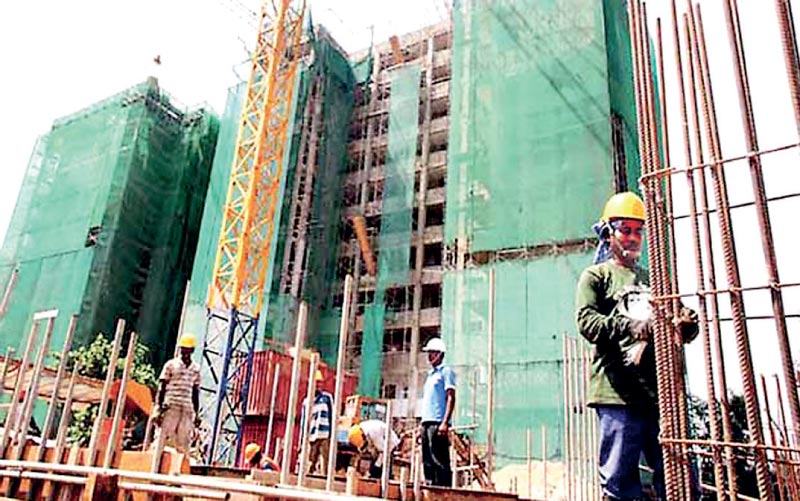Wednesday Feb 18, 2026
Wednesday Feb 18, 2026
Thursday, 2 January 2025 00:10 - - {{hitsCtrl.values.hits}}

To place the country on a trajectory of rapid economic growth and be in a position to settle the foreign loans confidently without further borrowing, the Government has to take drastic policy measures, learning from the mistakes in the past
 As we step into 2025, based on the performance of the construction industry during the period January to September 2024, we can hopefully look forward to a period of positive development. During the first three quarters of 2024, the construction industry recorded satisfactory positive growths of 14.2%, 15.5% and 23.8% respectively. This is a strong indication that we have overcome the recession the industry faced during 2020-2023.
As we step into 2025, based on the performance of the construction industry during the period January to September 2024, we can hopefully look forward to a period of positive development. During the first three quarters of 2024, the construction industry recorded satisfactory positive growths of 14.2%, 15.5% and 23.8% respectively. This is a strong indication that we have overcome the recession the industry faced during 2020-2023.
However, to place the country on a trajectory of rapid economic growth and be in a position to settle the foreign loans confidently without further borrowing, the Government has to take drastic policy measures, learning from the mistakes in the past. In particular following policy measures warrant serious attention of the Government.
Policies to uplift construction industry with sustainability
1. Projects above Rs. 200 million in value should commence only after a proper feasibility study is undertaken. To ensure this a National Planning Commission (NPC) similar to that in India, should be established and approval of the NPC should be mandatory for all projects exceeding Rs. 150 m.
2. Enact a Public Procure-ment Law as recommended by IMF.
At present there are widespread violations of the Government Procurement Guidelines. Procurement should be only on competitive bids on BOQs based on completed designs and documentation, to ensure timely completion and to minimise cost overruns. There shall be no unsolicited proposals considered.
3. Procurement action should commence only if adequate funds have been allocated in the Budget or secured.
4. To ensure transparency in government procurement process, procurement committees on works contracts over Rs. 200 million shall have a senior professional nominated by the Chamber of Construction Industry of Sri Lanka, as an industry representative.
5. Enact a Building and Construction Industry Security of Payment Act, similar to the law in Singapore.
6. Implement the proposal of the Presidential Commission on Simplification of Laws and Existing Regulations to ensure the issue of development permits within three weeks by amending the UDA Act to establish a statutory committee with time limits for granting these permits. As a more effective solution steps should be taken to introduce a fully on-line approval process within 12 months as practiced in Singapore now.
7. Establish a development bank to promote innovations and development of projects. NDB and DFCC which were development banks earlier have now become commercial banks after privatising. It is often said that the development banks played a leading role in the growth of Asian tiger economies.
8. Amend Arbitration Act to ensure that arbitration hearings and awards shall be concluded within three months from commencement similar to the practice in Singapore. Now this alternate dispute resolution mechanism takes a long period similar to normal courts proceedings.
9. Adopt a Code of Ethics applicable to all stakeholders of the infrastructure and buildings development process. Already such a code has been developed by Construction Industry Development Authority (CIDA), which can be adopted as a regulation.
10. Exempt housing and apartment developments from turnover taxes as such taxes will be an additional cost to the individual buyers of these units.
11. Introduce a housing loan scheme at a concessionary interest rate of 5% repayable over 40 years to the first-time home builders, similar to the two generations home loan schemes in Europe.
12. To promote export of construction services by undertaking works contracts abroad, Government to select 10 proven major contractors, in consultation with the Chamber of Construction Industry of Sri Lanka, and facilitate necessary bank guarantees in US$ for one contract each to these companies to undertake works contracts abroad. Each of these major companies shall award sub – contracts to two local companies, so that through this process 30 local companies will venture on overseas work.
13. Similarly, to promote export of consultancy services by undertaking consultancy contracts abroad, Government to select 15 proven consultancy firms registered with CIDA in consultation with the relevant professional institute and facilitate necessary bank guarantees and professional indemnity policies in US$ to these firms to undertake consultancy contracts abroad.
14. Harness the full potential of our graphite, rock phosphate and mineral sands deposits (in East coast and at Arawakkalu, Puttalam) with high-tech investments.
15. Enact the amendments to Construction Industry Development Act, No. 33 of 2014 and the Regulations and Rules thereunder including the Regulations for Contract Adjudication that were discussed at the National Advisory Council on Construction since 2016, without further delay.
16. Establish a Standing Steering Committee on Construction (SSCC), chaired either by the President or the Secretary to the President, or a Senior Additional Secretary to the President to regularly monitor the development projects with the authority to give directions to solve any issues impeding progress. This SSCC shall have suitable representatives from the construction industry, appointed in consultation with the Chamber of Construction Industry of Sri Lanka and shall meet at least once every month.
Policies to promote good governance and reduce corruption to attract more FDIs
1. Change Executive Presidential system to Westminster type of governance. In this regard proposals for 21st Amendment submitted by SJB in April 2022 are quite noteworthy.
2. Change the present PR system to a mixed system with 160 elected from the earlier electorates on the “first past the post” system and 56 on district PR, based on best runners up in the electorates on percentage of votes polled and 15 on national PR. This will avoid the need to campaign in entire districts spending large amounts.
3. Cabinet to be limited to 25 Ministers and 25 Deputy Ministers only and preferably ministry functions to be defined by the Constitution as in USA. Consequently, there shall be only 25 ministries.
4. CIABOC Commissioners to be appointed by the President on the recommendation of Constitutional Council selected after a transparent and merit-based process to ensure independence.
5. Any Minister when charged in a court of law to be immediately relieved of ministerial duties, as per the practice in public service. Any Minister or MP when found guilty by any court of law to be immediately removed from Parliament notwithstanding whether appealed or not to a higher court.
6. Take effective steps to promote a digital economy with all round cashless transactions similar to what has been implemented in India.
7. Take effective and practical action to recover ill-gotten assets and corrupt money invested abroad, through the Stolen Assets Recovery Initiative (StAR) implemented by the World Bank in collaboration with UN office on Drugs & Crime (UN ODC), if necessary, introducing new laws.
(The writer is Secretary General/CEO, Chamber of Construction Industry of Sri Lanka.)